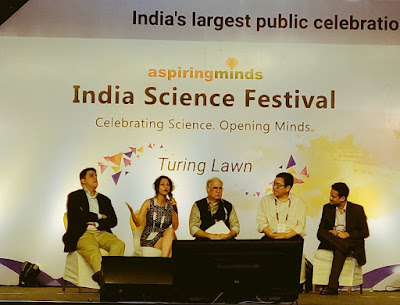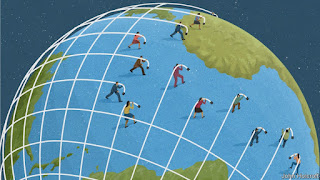New partnership with Microsoft India Researcher bears fruit
Nimmi Rangaswamy from Microsoft Research Labs India and I have been working on creating momentum in shifting the focus of ICTs for International Development (ICT4D) research towards a broader and less utilitarian perspective. Over the years, it has been interesting to see how Nimmi and I through our independent anthropological fieldwork were coming to a similar conclusion on the need to pay attention to "leisure" behavior of Internet users in emerging markets if we are to genuinely understand the multiple dimensions of new media practice in the global South. For instance, her research with Kentaro Toyama on cyberkiosks revealed the following:
From field ethnography, we find that urban youth slang and speech styles do not lag behind in villages. Neither do communication styles and channels. Instant messaging is immediately embraced by younger kiosk operators. Fan clubs of matinee idols bring in youth fashion and trends along with film music. Most popular films and film music are released within a month in hub-towns. Cassettes, pulp-film magazines, and even VCDs are snapped up quickly by rural consumers. We found in one case, that women from a village in Tamil Nadu flocked to a rural kiosk where an online celebrity chat was organized with the director of a contemporary soap opera. (Rangaswamy and Toyoma 2006: 5)
Around the same time, my book "Dot Com Mantra: Social computing in Central Himalayas" (Ashgate Pub) amassed evidence of a range of primarily leisure practices that users engaged in at cybercafes in rural Himalayas challenging notions of how rural people would be driven to use these new tools for mainly socio-economic mobility.
So naturally, when Nimmi and I connected at the ICTD conference in London 2010, we schemed up ways in which we could work together. Since then, she has served as a guest lecturer for my course on ICTs and International Development over the last 2 years. Also, we recently submitted a panel for ICA, a commentary piece for review at the ITID journal and are currently working on a book proposal on this very topic. It is indeed exciting when one finds a collaborator who one can seamlessly work with!
So its good to know that all this effort is starting to pay off with the recent acceptance of our article for publication "Digital leisure for development: Reframing new media practice in the global south" by the Media Culture & Society journal.
Below is the Abstract of this paper and as you can see, this is really a call for a shift in research. We hope its useful to those in this field !
Photoshopping of newlyweds, downloading the latest movies, teens flirting on social network sites and virtual gaming may seem like typical behavior in the West; yet in the context of a village in Mali or a slum in Mumbai, it is seen as unusual and perhaps an anomaly in their new media practice. In recent years, some studies (Ganesh, 2010; Mitra, 2005; Author removed, 2010; 2012; 2nd Author removed 2012; Kavoori, Chadha & Arceneaux, 2006) have documented these leisure-oriented behaviors in the global south and argued for the need to emphasize and reposition these user practices within larger and contemporary discourses on new media consumption. Yet, for the most part, studies in the field of Information and Communication Technologies for Development (ICT4D) have duly relegated such enactments as anecdotal. This is partly due to the fact that much of this research is driven by development agendas with a strong historical bias towards the socio-economic focus (Burrell & Anderson, 2009). Data that is not directly addressing project-based outcomes is sidelined. However, as emerging economies globalize and urbanize exponentially, and their users become more critical consumers and creative contributors of digital content or ‘prosumers’ (Bruns, 2008) and arguably free laborers (Scholz, 2012) instead of classic development beneficiaries, a paradigm shift is needed in approaching this new media audience with a more open-ended, explorative and pluralistic perspective.Thereby, this commentary piece serves as a call to rethink new media practices in the global south by looking at the implications and impacts of ICTs as leisure (entertainment/pleasure/ play) artifacts in the context of developing economies and emerging markets. We believe this line of inquiry is timely and enables a strategic bridging of the new media studies and development communication domain. Despite studies yielding insightful commentaries on ICTs in this arena, we believe resource constrained environments generating rich usages that are not overtly utilitarian have remained hitherto unexplored. A critical movement is needed among scholars focusing on emerging economies to re-conceptualize the mobilization and serviceability of ICTs to extend beyond a conservative understanding of developmental value. This will help in focusing on the heterogeneous and life enhancing aspects of technological use encompassing both experiential and purposive elements of ICT adoption: their interplay with systematic/systemic ecological constraints to provide an analytical and descriptive study of the technology spectrum and use in these contexts.
To illustrate our argument, we offer some critical points of contention that need addressing and new avenues for research if we are to rethink, reframe and refresh our thinking on Web 2.0 enactments in the global south.




Comments
Post a Comment